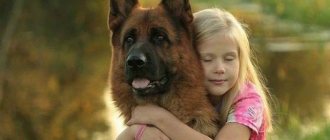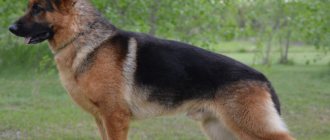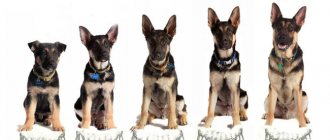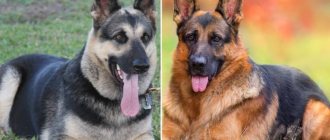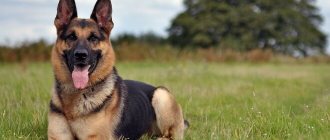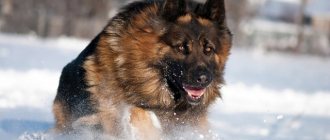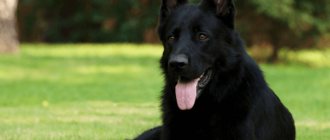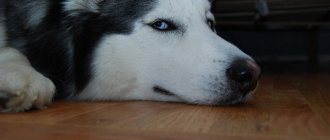Adaptation of a pet to an apartment
If a German Shepherd puppy will live in your apartment, then take care of safety from the very beginning. It is necessary to hide everything that the dog can reach (wires, shoes, children's toys), since at this age the baby will chew on everything without exception. Neglecting this rule can lead to negative consequences such as intestinal blockage or electric shock.
Decide where the shepherd dog will sleep, eat, and play in the apartment. This place is chosen once and does not change throughout the animal’s life. A secluded corner where there are no heating devices nearby is ideal for sleeping; it is not advisable to place the dog in a draft. The place should be bright; for practicality, purchase a mattress with additional pillowcases that are easy to remove and wash. In order for the puppy to have a clear view of the entire apartment, there are special indoor enclosures. This structure is located on a hill, so the shepherd dogs feel much more comfortable in the enclosure.
We recommend this article:
Benefits of feeding a German Shepherd puppy up to one year old
In the apartment
Living in an apartment dictates special requirements for the maintenance and care of a pet. Adult shepherds reach large sizes and are quite cramped in a small area.
The dog must be taken for long walks 3 times a day (1-1.5 hours). Upon returning home, the animal must wipe its paws and check for the presence of dangerous insects. To insure your pet against parasites, its fur is treated several times a season with flea and tick repellents.
In the apartment, the German Shepherd is given a separate place to rest. It should not be located:
- in the aisle;
- near batteries;
- in a draft.
For bedding, it is recommended to use a mattress with a removable pillowcase, which is changed when dirty. The puppy is also assigned a place for feeding, where a drinking bowl and a feeding trough are placed on a special stand (author of the video WORLD OF FOUR-LEGED).
Possible diseases
In general, the German Shepherd is a strong and healthy dog, but some members of the breed may suffer from hereditary genetic diseases. The most common problem is the musculoskeletal system. Even puppies suffer from pelvic and elbow dysplasia. Genetic diseases also include visual impairments (cataracts, corneal dystrophy, etc.).
Related article: What are the characteristics of a black German Shepherd?
Very often, shepherd dogs suffer from bloating, in this case the owner needs to reconsider the pet’s diet and make sure that he does not overeat. Otherwise, an allergy will follow, which is very difficult to notice in the early stages. With age, the likelihood of cardiovascular diseases increases. Males are more prone to these diseases. German Shepherds with a predominant black coat color are more likely than other representatives of the breed to suffer from distemper. Therefore, a timely visit to the veterinarian and scheduled vaccinations are mandatory procedures when keeping a shepherd dog in an apartment.
Education and training
Despite the fact that the breed is famous for its incredible intelligence, it is not easy to train. This naturally sharp mind manifests itself primarily in resourcefulness and cunning, so as not to follow commands, but to idle around. Therefore, before starting training, you need to stock up on such qualities as constancy, perseverance and patience. Education must begin from the moment the puppy appears in the house.
It is very important to be an undisputed leader for a dog, the leader of the pack. All skills must be practiced exclusively in a playful manner, without the manifestation of negative emotions in case of disobedience and with pronounced encouragement for obedience. The use of violence or raising the tone is excluded. The best training option is to take special courses from a professional trainer (not a dog trainer!). If you decide to do this yourself, it is important to follow the basic rules:
- Clear pronunciation of commands. If you “sit”, then it is “sit”, and not “sit down” or “sit down”.
- Intonation: for encouragement - one, for punishment - completely different. A dog, no matter how smart it is, does not understand words, but only intonation.
- Gestures (exclude sudden movements, swinging at the dog).
- The younger the pet, the more important encouragement is - a word, intonation, a treat.
- Training is indicated only for healthy individuals.
- At first, only one person conducts the class.
- Classes should be carried out before feeding, in the morning or evening, in dry, warm and windless weather.
REFERENCE! In order not to spoil your pet with your ignorance in matters of education, you can use the advice from the book “What is your dog thinking about” by animal psychologist J. Fisher.
How to teach cleanliness
Before the first vaccinations, it is strictly forbidden to take the puppy outside, so he will have to cope with all his needs in the house. As soon as the opportunity arises to go out into the fresh air, immediately begin toilet training your dog. You shouldn’t delay the moment, otherwise the puppy will get used to going to the toilet at home, but will tolerate it outside. Try to take your puppy outside immediately after waking up and eating. At first you will have to get up at night, but there is no need to worry about this, since the “Germans” are smart animals, so they get used to it quickly.
Be sure to praise your pet on the street for relieving itself and give him treats.
We recommend this article:
How to stop a dog from peeing in the wrong place at home
Dispatch of natural necessities
Like any animal, a dog needs to relieve its natural needs while living in a city apartment. If the puppy is still small, you need to immediately teach him to do this outside. It is best to take your pet out early in the morning and in the evening. Of course, at first you will have to get up and take the dog out at night. But shepherd dogs are a very smart and understanding breed, so they quickly get used to sending their needs on the street, and not in the home.
What to prepare for when living in an apartment
Keeping a German Shepherd in an apartment is difficult both for the owners and for the animal itself. But if you follow some rules, then all the inconveniences can be minimized. The very first problem dog breeders face is hair. You will have to clean quite often; regular brushing of the dog will reduce the amount of cleaning the floors. For the undercoat of this breed, it is best to purchase a furminator.
An important aspect of keeping a shepherd in an apartment is walking. If you do not have the opportunity to take your dog outside 2 times a day (at least an hour), then keeping an animal in your apartment will be a crime. Nutrition is selected individually for each individual: some will prefer commercial food, while others will prefer natural food. In any case, we must not forget about vitamins and additional microelements. If you are ready to take into account all the aspects of properly keeping an animal in an apartment, then feel free to get a new family member.
Similar article: Weight and height of a German Shepherd puppy by month
General rules for keeping a dog at home
The choice of a pet's habitat remains up to its owners. However, there are rules that do not depend on where the pet lives.
- Your dog should always have access to clean drinking water. The container is placed next to the food bowl. Change the water 1-2 times a day.
- The pet's health must be carefully monitored. Ears, eyes, and teeth are periodically cleaned. If an animal is suspected of being sick, it is taken to a veterinarian.
- It is important to train your German Shepherd. Representatives of this breed are easy to train, so it will not be difficult for owners to teach their pet several basic commands.
- Timely vaccinations will help keep your animal healthy.
Dogs cannot lead a full life without human help. Proper care of your German Shepherd will help you grow it into a loyal companion, a reliable protector and a good friend. Owners whose pets are surrounded by love and attention understand that the dog will respond in kind.
Features of walking a dog
While in the house, the dog does not receive enough sunlight and fresh air. Therefore, long walks are the basis of a “German’s” health. While your pet is still a puppy, you can let him run around the clearing, yard, frolic with children and other animals, but do not allow moments of aggression. Having played enough, the puppy will tell you when it’s time to go home. In the first years, they quickly get tired, lie down at their feet and try to fall asleep. At an older age, the walking time will increase, the dog will require active games, physical activity, and additional training. In crowded places it is recommended to keep your dog on a leash and use a muzzle.
Features of keeping a German Shepherd
“Germans” are quite large and energetic creatures. The owner will have to spend a lot of time and effort walking and exhausting his pet. This is especially true for puppies and adolescents, whose energy is “overflowing.” This is why most dog trainers advise taking a puppy to a private house with a large and spacious yard.
In a private house
If we remember the history of the development of the breed, namely that German shepherds were bred as herding dogs, then there will be no doubt about their keeping in private homes. These dogs are absolutely not afraid of fresh air and adverse weather conditions. They feel good living outside, the main thing is to build a spacious enclosure and put up a warm booth.
Important! A German Shepherd cannot be chained. If the dog needs to be isolated for a while, it can be locked in an enclosure.
Owners of outdoor shepherds need to regularly examine their pet's eyes, ears and claws. If any wounds appear on the face, the animal should be shown to a veterinarian. Also, do not forget about treatment for fleas, ticks and worms. Dogs that are constantly in an enclosure, just like dogs living in an apartment, need to be walked regularly.
Important! A “German” living in the yard will become an excellent guard of his home.
Most dog handlers will unanimously say that keeping a German Shepherd on the street is the most convenient and rational option. However, if you follow some rules and have a strong desire, representatives of this breed can feel quite comfortable in a city apartment (not a small one).
In the apartment
Although German shepherds do not belong to the category of decorative dogs, sometimes they become residents of apartment buildings. People who have placed such a large dog in a small area should try to provide the pet with everything necessary, namely:
- a comfortable place to sleep, relax and eat food. The bathroom, kitchen, corridor and balcony are absolutely not suitable for these purposes. The dog should rest in a secluded, warm place;
- bedding that will be comfortable for both the dog and its owner. It should give comfort and warmth to the first, and the ability to easily clean it of wool and debris to the second;
- slicker brush and combs, which you cannot do without during shedding, which happens 2-3 times a year;
- toys that will help the shepherd pass the time while the owner is not at home.
Important! Although “Germans” are considered one of the most people-oriented breeds, they will not be able to live in conditions of constant stress. Owners should not invite strangers into the house too often, or behave too noisily or emotionally.
Pros and cons of content
The advantages of keeping a “German” in an apartment include:
- unpretentiousness. The dog adapts quite easily to any living conditions;
- high security qualities. Will always act as a defender of any family member or apartment;
- non-conflict. The dog will get along with any other pet and will become a true friend for children and the elderly.
The disadvantages will be:
- active life position. Shepherds are surprisingly active, so the lack of opportunity to splash out energy is fraught with consequences;
- physical strength. If there were omissions in training the animal, then aggression may be directed against household members;
- fear of loneliness. “Germans” are devoted animals, so a long absence of the owner can provoke mental disorders.
We recommend this article:
How long do German Shepherds live at home?
Choosing a puppy and caring for it
How to choose the right puppy?
If you are purchasing a dog to participate in sports competitions, breeding, or to serve in the army, on the border, or in the police, then this is not an easy task, and only a highly qualified expert who himself is involved in breeding German shepherds can help you make the right choice.
To choose a companion, colleague, friend and family member, it is enough to visit several well-established nurseries or breeders, study forums and websites on the topic. You can also invite a specialist. Remember that professionals will not sell German Shepherd puppies before they are two months old.
You need to choose a strong, well-groomed “German” that meets the standard descriptions. He should be curious, playful and courageous, not feel anxious or timid when in contact with a stranger, and not be afraid of noise or sharp sounds. Ask the breeder to see his parents to make sure that the pet will match your ideas about the breed. Do not forget about the mandatory presence of documents: a birth certificate and a correctly completed veterinary passport. At the time of sale, the puppy must receive two vaccinations, parasite prevention and deworming, and have an identifier (stamp).
First days in a new place
Changing living conditions is a huge stress for such a baby. It can provoke apathy and stomach upset, so stock up on enterodesis and rehydron in advance. You may have to give your new household member a water diet for the first 5 to 10 hours.
Do not jerk the puppy with your attention, do not try to involve him in play, caress him, much less pick him up, cuddle him and press him to your chest. When he gets used to it, he will make contact himself. It is important to continue feeding the baby the same food that the breeder had, usually dry food, and to follow the usual daily routine. Never mix goodies like yoghurts, curds or sweets into dry food. This could end badly. The transition to natural food can be done no earlier than the dog turns one year old.
After some time, the “shepherd dog” may begin to miss his mother and his previous home - whining, demanding attention and asking to be held. At such moments, it is important not to succumb to provocations and simply not react, then he will understand that he will not be able to manipulate you and will calm down. The habituation process usually takes 2–3 days.
Make sure that your new pet has toys, constant access to water, and is away from objects that he can chew.
